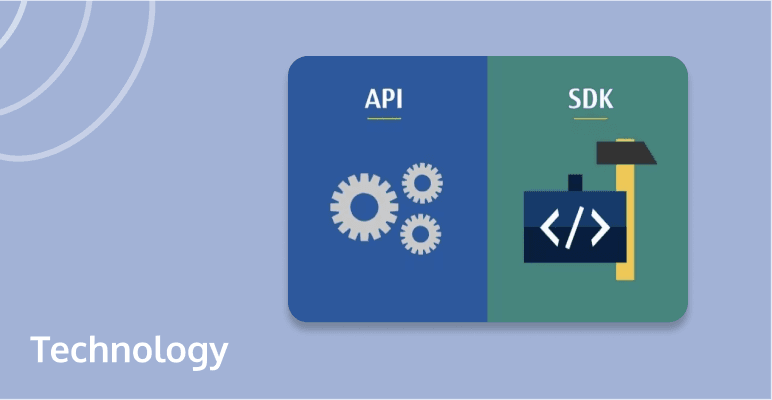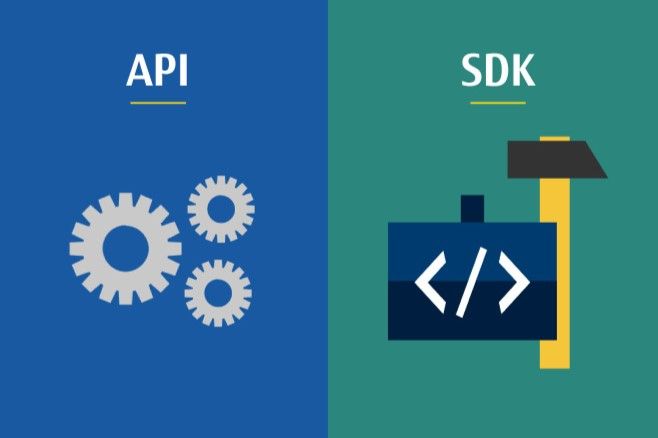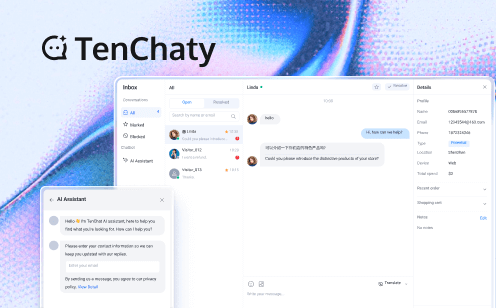
Living in the digital age, it's essential to understand the fundamental software development components, such as SDKs and APIs. This article will explore the differences between SDKs and APIs, explain how they work, discuss how to choose between them and provide additional insights into the benefits of using Tencent RTC for real-time audio and video calls.
What are SDKs?
Let's start with the meaning of SDK. Software Development Kits (SDKs) are comprehensive toolsets that enable developers to create applications for specific platforms, software frameworks, or hardware systems. These kits typically include libraries, documentation, code samples, processes, and guides necessary for developing a software application. SDKs streamline the development process by providing a predefined set of tools, allowing for efficient and standardized creation of applications. They act as building blocks, offering developers the functionalities needed without the need to code them from scratch. By simplifying complex coding tasks, SDKs significantly reduce development time and effort, enabling a more focused approach on application innovation and user experience.
Some of the key components of SDKs include:
- Libraries: Collections of pre-written code that perform specific functions, enabling developers to avoid writing repetitive code and focus on building unique features and functionality for their applications.
- Documentation: Detailed instructions and information on using the SDK and its components, including code examples and best practices for application development.
- Tools: Utilities and programs that assist in various aspects of the development process, such as debugging, testing, building, and deploying the application.
- Sample Code: Ready-to-use code snippets or demo applications that showcase how to use the SDK's features and can be readily integrated into the developer's project.
SDKs offer numerous benefits to developers, including:
- Streamlined development process
- Consistency in application performance and functionality
- Faster time-to-market due to reduced development time
- Simplified learning curve and support with provided documentation and tools

What are APIs?
Application Programming Interfaces (APIs) are a set of rules or protocols that enable different software applications to interact with each other. APIs define how requests for data or services should be made, as well as the data format that should be used for the response. An API works like a messenger, sending a request, or an action to another application and then delivering the response back. For instance, when you order food at a restaurant, you (the client) order a meal but don't communicate with the kitchen directly. The waiter (API) sends your order (the data request) to the kitchen (the server). The kitchen prepares the meal and returns it to you through the waiter. In a word, they act as an intermediary, allowing developers to access another software application's features, data, or services without having to know the inner workings of that application.
APIs can be classified into two main types:
- RESTful APIs: Representational State Transfer (REST) APIs use standard web protocols, like HTTP, to interact with web services and exchange data in formats such as JSON or XML. RESTful APIs provide a straightforward, scalable, and reliable way for systems to communicate over the internet.
- SOAP APIs: Simple Object Access Protocol APIs are web-based communication protocols that facilitate data exchange between software applications. SOAP APIs use XML as the data format and typically require more complex configurations and verbose messaging compared to RESTful APIs.
APIs offer several advantages, including:
- Scalability and flexibility in application development
- Efficient data exchange between various platforms and systems
- Secure and controlled access to specific features, data, or services
- Consistent interface for different applications to communicate
Differences between SDK and API
API and SDK are both essential tools in software development. Understanding the difference between SDK and API is crucial for developers and project managers alike.
- Purpose: An SDK is a comprehensive suite of development tools, encompassing everything a developer needs for a specific platform or language. It includes libraries, documentation, code samples, and often an API. On the other hand, an API serves as a specific interface, allowing different software applications to communicate with each other. It's a set of rules and protocols for building and interacting with software applications.
- Scope: In terms of scope, SDKs offer a broader array of tools and resources, facilitating a wide range of development tasks. They're designed to provide developers with all the necessary components for building applications on a particular platform. APIs, in contrast, are more focused, enabling access to specific functionalities or data sets of an existing application or service.
- Integration: When integrating into projects, SDKs and APIs also differ. An SDK, being more extensive, can shape the entire development process, offering the necessary building blocks and environment for software creation. APIs, however, are generally used to add specific functionalities to an existing application or to allow different applications to interact.
Choosing between SDK and API
Having explored the fundamental differences between Software Development Kits (SDKs) and Application Programming Interfaces (APIs), it's clear that each serves distinct roles in the software development landscape. Let's now move on to understanding how to make the best choice between an SDK and an API for your specific project needs.
1.Project requirements and complexity.
An SDK, being a full suite of tools, is often beneficial for more complex projects requiring a range of functionalities. It offers a cohesive development environment, which can be particularly advantageous when building comprehensive applications. Conversely, APIs are ideal for simpler projects or when you need to integrate specific functionalities without the overhead of a full toolkit.
2. Developer expertise and resource availability.
The developer's expertise and resource availability also play a critical role. An SDK may offer a steeper learning curve but provides a more integrated experience with extensive documentation and support. If your team is already familiar with the platform the SDK is designed for, it can expedite development. On the other hand, APIs, with their straightforward approach, can be more suitable for teams with varied expertise or limited resources.
3. Long-term maintenance and scalability considerations.
Assess how the choice between an SDK and an API will impact the future scalability of your project. SDKs can offer more comprehensive support and updates, which is crucial for long-term maintenance. However, they might also lead to greater dependency on the provider. APIs, while more flexible, may require more effort to scale and maintain over time.
Following our exploration of choosing between SDK and API, it's time to learn how Tencent RTC utilizes these technologies to enhance real-time communication. Our API Examples, such as the Call and Conference APIs, enable seamless integration of audio/video calls and collaborative audio-visual interactions into various applications. On the other hand, our SDK Examples, including the RTC Engine and the GME SDK, offer comprehensive solutions for voice and video calling, live broadcasting, interactive streaming, and in-game chat with advanced features like 3D spatial voice processing. At Tencent RTC, we continuously strive to provide the most efficient and innovative real-time communication solutions globally.
Conclusion
In conclusion, both SDKs and APIs are vital tools for software development. SDKs provide the necessary resources to build and customize features tailored to your product's needs. APIs enable seamless integration wherein different applications can collectively enhance the user experience. Always remember, when choosing between SDK vs API, evaluate your product's goals and growth to make the most informed decision.
If you have any questions or need assistance, our support team is always ready to help. Please feel free to Contact Us or join us in Telegram.


